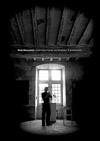 An hour of mostly solo cornet played in a French monastery might seem a strict challenge. And that's the point here as Rob Mazurek battles his more extreme urges on 11 compositions recorded at Fontevraud l'Abbaye and dedicated to the controversial Robert D'Arbrissel who founded it in 1099.
An hour of mostly solo cornet played in a French monastery might seem a strict challenge. And that's the point here as Rob Mazurek battles his more extreme urges on 11 compositions recorded at Fontevraud l'Abbaye and dedicated to the controversial Robert D'Arbrissel who founded it in 1099.
Rob Mazurek is director of Exploding Star Orchestra, leader of Isotope 217 and various aggregations of the Chicago Underground jazz group, and has worked with Tortoise, Brokeback, Stereolab, and Gastr del Sol. In 2005, Mazurek was granted an artist residency at Fontevraud. He produced paintings from watercolors and local wine, videos, writing, piano compositions, and (on May 27 & 28, 2005) this recording.
Abstractions comes with a fine booklet including photgraphs of the recording sessions. They give an idea of the incredible acoustic environment in which Mazurek was working. Apparently, he spent time playing all over the abbey in the late evenings until late at night benefitting from the amazing sound qualities. One photograph of him standing way off in the distance in the enormous abbatiale is especially evocative. Annoyingly, though, the packaging is a rectangular shape and has no reference to artist:album title on the spine. I suppose it looks tasteful but storing and finding it could be rather annoying.
The impact of the first notes is stunning, but none of the entire hour of recording disappoints. The cornet is given time and space to articulate Mazurek's notions and feelings about the history and atmosphere of the location; and yet the introduction of other sounds provids timely contrast and support. I particularly like the warmth generated by the piano at the beginning of "The Torso" but even the birdsong on "Meditation and Skyward Motion" works. Tracks are titled to focus on the parts of the body as separate from each other, and in consideration of flesh, the physical, and the spirit.
Robert D'Arbrissal was known for his extreme asceticism. He supported Gregorian clerical reform and was first a destitute hermit and then a wandering, barefoot, hair-shirt wearing preacher. According to Grover A. Zinn in Medieval France, in both of these guises Arbrissal attracted many followers, especially women. His popularity and his single-mindedness led to the founding of an abbey at Fontevraud, near the Loire river in the diocese of Poitiers. The site had separate buildings for monks and nuns. Accusations were rife that Abrbrissels took in protitutes and that the nuns shared Arbrissel's bed as well as the church. However, evidence suggests that it was fear of the practice of syneisaktism (or subintroducta), which was at the root of the criticism. This spiritual marriage of people of the opposite sex, two spiritual souls who avoid sexual relations, tested the notion of gender and challenged the notion of male superiority.
When Mazurek asks a brief question at one point on the album, rather than shattering any spell, this serves as a link to (or reminder of) the present. Similarly, the final piece "Sound and Silence" starts briskly but is then silent for five minutes until we hear people walking and talking in the abbey amidst the faint echoes of music and whatever residue of other past sounds still remains at Fontevraud.
samples:
Read More

